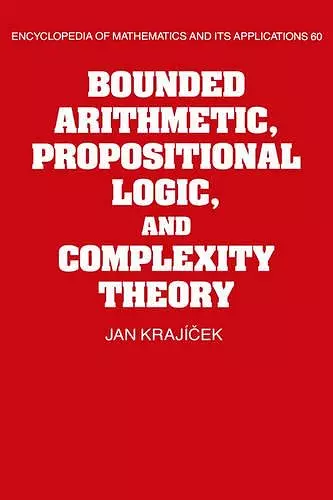Bounded Arithmetic, Propositional Logic and Complexity Theory
Format:Hardback
Publisher:Cambridge University Press
Published:24th Nov '95
Currently unavailable, and unfortunately no date known when it will be back

Discusses the deep connections between logic and complexity theory, and lists a number of intriguing open problems.
An up-to-date, unified treatment of research in this interdisciplinary subject, with emphasis on independence proofs and lower bound proofs. The author discusses the deep connections between logic and computational complexity theory and lists a number of intriguing open problems.This book presents an up-to-date, unified treatment of research in bounded arithmetic and complexity of propositional logic, with emphasis on independence proofs and lower bound proofs. The author discusses the deep connections between logic and complexity theory and lists a number of intriguing open problems. An introduction to the basics of logic and complexity theory is followed by discussion of important results in propositional proof systems and systems of bounded arithmetic. More advanced topics are then treated, including polynomial simulations and conservativity results, various witnessing theorems, the translation of bounded formulas (and their proofs) into propositional ones, the method of random partial restrictions and its applications, direct independence proofs, complete systems of partial relations, lower bounds to the size of constant-depth propositional proofs, the method of Boolean valuations, the issue of hard tautologies and optimal proof systems, combinatorics and complexity theory within bounded arithmetic, and relations to complexity issues of predicate calculus. Students and researchers in mathematical logic and complexity theory will find this comprehensive treatment an excellent guide to this expanding interdisciplinary area.
'This interesting book provides a brisk account of current research in bounded arithmetic and the complexity of propositional logic.' Mathematika
'It can be strongly recommended especially to mathematicians and computer scientists working in the field and to graduate students.' European Mathematical Society Newsletter
ISBN: 9780521452052
Dimensions: 242mm x 162mm x 27mm
Weight: 650g
360 pages